- Home
- Blake Crouch
Snowbound Page 2
Snowbound Read online
Page 2
Debra bore a strong resemblance to her daughter, right down to her trim figure and black hair. From across the room, they could’ve been mistaken for sisters. Closer up, her silver roots showed and the added decades of living in these desert borderlands and the punishment of the sun became evident in the leathering of her face, which more resembled hide than skin.
“I couldn’t remember if you took ice or not,” she said.
“Yeah, I do. That’s perfect.” She handed him his fourth Maker’s of the evening.
“Can I take her?” Debra motioned to her granddaughter, who had fallen asleep in Will’s arms, and he’d have let her, but she was near bulletproof with Valium and vodka.
“I need to hold her, Mom.” As he sipped the whiskey, his face flushed with heat and he theorized through the bourbon-embroidered fog that maybe Rachael’s funeral had already happened and he’d blocked everything out—the eulogies, the stern-faced pallbearers, his daughter in hysterics as she watched her mother’s casket being lowered into the ground.
He staggered to his feet and carried Devlin back to her bedroom. She was beyond exhaustion now. So was he. He tucked her in, knelt on the floor, spent several moments watching her sleep, feeling a sharp pinch in his gut every time he breathed. After awhile, he got up, headed for his bedroom. His and Rachael’s bedroom. He shut and locked the door after him, opened the sweater chest that stood at the foot of their bed.
He found it near the bottom—a tattered sweatshirt that Rachael wore religiously when the weather turned cooler. It was navy blue and had years ago evinced the name of her alma mater, the washing machine having long since stripped away the white lettering.
He brought the sweatshirt to his face and smelled his wife.
On his way back to the den, he stopped at the guest room. Someone sobbed loudly behind the door. He opened it. There were no lights on, but as his eyes adjusted, he discerned the ponderous form of Rachael’s sister, Elise, curled up in the corner beside a dresser.
“You all right?” he asked. It took her a moment to catch her breath. Looking out the window above her head, he noticed strange lights in the front yard.
“She’s dead, Will. I can feel it.” He shut his eyes and braced against the concussion of her words, could have struck her for giving voice to the malignant prediction on all of their minds. “Can’t you feel it, Will?” He closed the door and went back into the den, grabbed his whiskey from the end table.
One giant swallow and he’d reinforced that beautiful cushion that was padding him from reality, the room humming now, just a few sips shy of spinning.
He was en route to the front door to investigate those lights in the yard when someone caught him under the arm.
“Hey, Will. You hanging in there, guy?” He couldn’t recall the man’s name, and then he realized why. It was a neighbor, but they’d never met. Will recognized him only because the man was usually washing a white Lexus in his driveway on Saturday mornings whenever Will and Rachael drove past his house on the way to the gym.
He was Will’s age, Latino.
“I’m sorry, what’s your name?” Will asked.
“Miguel. We always exchange waves when you and your wife pass by my house. I saw the news, all the cars out there. Thought I should come by. If there’s anything I can do. . . .”
Will could feel his eyes welling, and whether it was prompted by the whiskey or the totality of this terrible day, he was suddenly overwhelmed by the kindness of this man he knew only through gestures.
“Thank you, Miguel.” He wiped his eyes, cleared his throat. “Why don’t you go get something to eat, something to drink. They’ve got a whole buffet thing going in the kitchen.”
When Miguel was gone, Will opened the front door and stepped onto the porch.
He whispered, “Oh God.” The cushion evaporated. The crushing load of Rachael’s absence ripped the breath out of him and he crumpled down on the steps, thinking, So this is really happening. It had become a parking lot out in the street. He spotted a news van one block over, a large satellite dish perched on its roof. And in the long grass of the front lawn, a dozen people stood in a circle between the yuccas and saguaros, their faces lighted by the candles in their hands, flames quivering in the evening wind blowing in from the desert.
He sat watching the circle of flames, the sky deepening into dusk, his stomach hurting so much that he could manage only the shallowest of breaths as he strained to hear their words.
A woman’s voice reached him: “Dear Lord, You say that where two or more are gathered in Your name that You are present. Well, here we are Lord, and we’re asking for the deliverance of Rachael Innis.”
He struggled to his feet and stumbled toward them through the grass. He hadn’t prayed in years, since they’d found out their daughter was sick. A standoff fuckoff with God. That ended tonight.
SIX
Will slipped away from the circle of candles and started back toward the house to check on Devlin. Though he’d wanted to, he hadn’t prayed aloud. It had been a long time and he was rusty at talking to God, particularly in the presence of strangers.
As he reached to open the front door, it swung back. Rachael’s mother was standing on the threshold, distraught.
“There’s a detective in the living room, Will. He wants to talk to you.”
For some reason, Will had expected a younger man, perhaps his age, with a buzz cut and stern, distrusting eyes. Having dealt with many cops as a defense attorney, he’d come to regard them as authority junkies, an unimaginative and reactionary bunch prone to forming fast, unmovable opinions. But at first glance, the detective on his couch proved none of his prejudices. The man was sitting between two of Rachael’s girlfriends from yoga class, his hands flattened out on his knees, gazing with a Zen-like calm at a framed photograph over the mantel—a picture from their Grand Canyon vacation two summers ago. He was an older, clean-shaven gentleman with stark white hair and clear blue eyes, and when he saw Will, he rose to his feet, buttoned his jacket, and flashed an appropriately restrained smile.
“Mr. Innis,” he said as they shook hands. “Detective Teddy Swicegood. You’ve cross-examined me in court a few times, if I’m not mistaken. But don’t worry. Won’t hold it against you. I’m so sorry to be here under these circumstances.”
He had at least four inches on Will, and his wizened face belied the strength of his handshake and the lean, solid build beneath the Sears suit.
“You have news?” Will asked.
“It’s pretty crowded in here. There someplace we can talk in private?”
“Yeah. You want a drink?”
“I wouldn’t object to a whiskey.”
Will poured a pair of whiskies and led Swicegood through the sliding glass door. There were a half dozen people on the deck, most of whom he didn’t recognize, sitting on chairs dragged out from the breakfast table and eating off paper plates like they were at a cookout.
The two men walked down the steps and crossed the grass to a weathered fence that ran the length of No-Water Lane and separated the backyards of Oasis Hills from the desert.
Will leaned on the fence, steeling himself, and said, “Just tell me. Don’t beat around—”
“We’ve got APBs out everywhere across the Southwest and we’re working with the Mexican authorities, as well.”
“You haven’t found her?”
Swicegood shook his head.
“But you think she’s alive.”
“I don’t know.”
“Your opinion?”
“Mr. Innis, it’s just too early to be—”
“Please. Take off the fucking kid gloves.”
“That’s a bad stretch of highway she disappeared on. Notorious for drug running, human trafficking. It doesn’t look good.”
The words hit Will like drops of acid, and it struck him that following a tragedy, grief comes in waves, each bigger than the previous, each carrying a new component of pain. They stood there drinking bourbon, looking south
across the desert toward Mexico, where only a tinge of light lingered in the sky, lying across the horizon like the last thread of day.
Then it vanished and stars appeared, numerous and vivid. A coyote cried. He heard the rustling of a large animal, probably a mule deer, running through the sage. Will thought about Rachael, somewhere out there, maybe alive, maybe not, and he knew he wasn’t even close to the pain yet. But he could sense it lurking on the outskirts. It would be waiting for him in the morning when he opened his eyes to face this nightmare all over again.
A match flared. Swicegood lighted a cigarette, blew out the flame. He licked his thumb and forefinger and squelched the heat from the glowing match head before flicking it into the grass. He took a deep drag and sent a train of smoke curling into the desert.
“I was wondering, Mr. Innis, is there someone who could watch your daughter for a little while?” Will had been leaning on the fence. Now he turned and faced the detective. His head wasn’t clear. It took a moment to locate the exact words he wanted.
“Why would she need to be watched?”
“I thought you and I could ride over to the station. Have a little talk.”
The air between them turned electric.
“What about?”
“I’ll be waiting in my car. It’s parked behind the news truck with the satellite on top. You go make sure your daughter’s taken care of, then come on out.”
Will knocked back the whiskey and set the empty glass on the fence post. The darkness seemed to tilt. He felt clammy, sweat beading on his face.
“Shit.” He staggered ten feet away and retched into the grass, stood hunched over, looking back toward the house at all the silhouettes moving like ghosts behind the windows. He took in the dark stillness of the desert, the wet chill of the grass blades brushing at his bare ankles. He wiped his mouth. “You’re serious?” he asked.
“I am.”
“Do I need to bring a lawyer?”
“I don’t see why at this point. I just need you to answer a few questions. Help me sort something out. So, my car. Five minutes.”
SEVEN
Javier wanted coffee—strong and scalding—and as if his desire had conjured its own object, the sign for a freestanding Starbucks appeared a quarter mile ahead, beside a gas station just off the interstate.
It made him nervous, leaving the woman alone, but she was reasonably secure, more than reasonably drugged, and if he was going to reach Idaho without drifting off and killing them both, caffeine would be required.
Into Starbucks and the intimate odor of the beans and the chromed shine of mugs, French presses, and espresso machines as world music throbbed through speakers in the ceiling.
He counted nine people in line ahead of him.
Rachael floated in a warm, dark sea. It seemed to take years just to open her eyes, and when she did, the world was awash in blinding streaks of light, echoes of jumbled sounds. She moaned softly, though not from pain, but a burning euphoria.
She sat in the front seat of the Escalade, restrained only by a seat belt. The car was stationary but idling. She managed to rotate her head toward the empty driver’s seat.
Looking through the tinted window in front of her, she tried to get a handle on her surroundings, but the slightest movement blurred light and distorted objects beyond recognition. With her head swimming, it took extraordinary willpower to keep her thoughts from derailing into dreamy and meaningless directions. She possessed a dim awareness that she was in trouble, but she couldn’t remember what kind, or the events that had preceded this moment. All she knew was that she needed to get out of the car before the driver came back.
As Rachael stilled herself, the outside world eased into focus. She made out the bright lights of a familiar chain, the Escalade parked near the entrance.
Inside, she spotted a line to the cash register. The man who had been driving the Escalade stood at the end, watching her.
From his place in line, Javier had a view through the storefront glass, saw the woman was no longer draped unconscious in the front passenger seat, but struggling to sit up.
A customer collected her drink, the line shuffling forward.
The next couple ordered lattes and items from the pastry case, beside which he now stood, watching the hands of the heavyset barista reaching for two pieces of crumb cake.
He glanced outside. The woman was looking down, having probably noticed what he’d done to the seat belt.
Next customer, a truck driver.
“Just coffee, darlin’.”
Good man.
Then a woman after some high-end water, a twenty-second transaction, swipe of the credit card, Javier feeling a jolt of anticipatory excitement at the caffeine coming his way and getting back on the road again, as that redneck with the braids loved to sing.
She reached to undo the seat belt, but the button had been wrapped several times in duct tape. Too groggy and weak to tear it off, she lifted her arm instead, and on the fourth attempt, she touched the switch on her door that lowered the automatic window.
The tinted glass descended quickly into the door. Night air swept in, reeking of gas and oil. In the near distance, an interstate droned with the ceaseless hum of traffic. The air was far too cool for southern Arizona, and through the fog of the drug, she wondered how far she was from home.
Just a family ahead of him now—mom and dad, teenage girl, young boy who’d been stealing glances at Jav ever since he’d walked into the store.
Dad: coffee.
Boy: hot chocolate.
Girl: latte.
Javier glanced at his Escalade, saw the window sliding down on the passenger side.
Mom: “I’ll have an iced, skinny, venti, ten-pump chai latte, hold the whip.”
Javier glared in the general direction of the register as a tremor of murderous irritation pulsed between his temples.
The barista, grinning, said, “Could you say that one more time, and just a tad slower.”
“Iced. Skinny. Venti. Chai latte. Ten pumps. Hold the whip.”
“I have to charge you for the extra pumps.”
“That’s fine.”
“It’s my second day, so let me be sure. When you say ‘skinny,’ you mean—”
“Nonfat milk.”
The barista grimaced, bracing for the deliverance of bad news. “We just ran out.”
“Oh no.” Mom slumped in devastation as Javier calculated that his BP had risen to 130/90, the tips of his ears tingling.
“We have two percent.”
“How about one?”
“Sorry.”
“What if you made it with water?”
“Water?”
“Instead of steamed milk.”
“Um, I’ve never heard of doing that, but I guess I could. You’re the customer, right?”
It wasn’t going to stay inside like he’d hoped, and he knew enough about himself to realize that if he just stood there watching the fuse burn down, he’d end up doing something combustive and reckless, like that time in Juárez.
Javier opened his mouth, not to say what he really wanted, just to cool himself off, a quick pressure release to get things back to baseline.
“Have you ever tried coffee?” he asked brightly, the family turning as one to see who’d spoken. Javier smiled, felt the hate exuding through his teeth, hoped it overshot them. “They have their Anniversary Blend available tonight. And all you have to say is, ‘Anniversary Blend, please.’ None of this complicated ordering. And do you know what? All the barista has to do is take a cup, or a mug if it’s for here, and fill it up. And then you are done and the next person can order.”
“I’m taking a long time, aren’t I?” the mom said. “I’m sorry.”
“This is your favorite drink?”
“Guilty as charged. I have two chai lattes a day.”
“Ah.”
“May I buy your coffee? For the inconvenience?” He couldn’t tell if she meant that she was really sorry, or that
he was a giant asshole, but he admired her for treading the line so well, even as he despised her.
“No, thank you.”
A family emerged from Starbucks, carrying a tray of drinks.
Rachael leaned over and hung her arms out the window, resting her chin against the strip of weatherproofing. She raised an arm, let it drop with a bang against the door.
The adults had already passed by without noticing her.
She raised her arm, let it bang again. The young boy glanced back, and when he saw her, he stopped, his eyes narrowing.
Help me. He cocked his head and stared at her. Rachael’s face was lying against the door, her skin milky, sweating, her eyes crossed.
“Help me,” she mouthed.
The boy approached the door.
“Help me,” she whispered. “I’m not supposed to be here.”
“You look funny,” he said. “What’s wrong with your eyes?”
Rachael fought to keep them from rolling back in her head.
“Donnie, let’s go, pal! You’re holding up progress!”
“Dad, there’s something wrong with this woman!”
Oh thank you. Thank you. Rachael was on the brink of losing consciousness again, the heroin raging through her blood. She lost the boy to swirls of trailing light, made her eyes bring him back into focus. He looked to be Devlin’s age, and now a man was standing beside him, looking down at her, his brow furrowed. He was soft and round, a young father yet to shed his baby fat, filling out his khaki shorts and yellow polo shirt. His mouth was moving, but it took her a moment to connect the movement of his lips to the sounds they made.
“. . . need a doctor or something?” Get me out of here. “. . . person who’s driving you inside?” Oh God. Please. “. . . can’t understand a word you’re saying.”
The brown-skinned, blue-eyed man who’d taken her walked up behind the boy and his father.
Rachael tried to lift her eyes from his boots—they appeared to have been fashioned from the pebbled black-and-yellow skin of Gila monsters.

 Abandon
Abandon Break You
Break You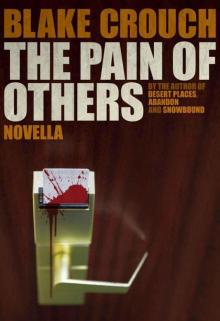 The Pain of Others
The Pain of Others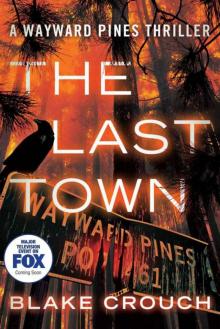 The Last Town
The Last Town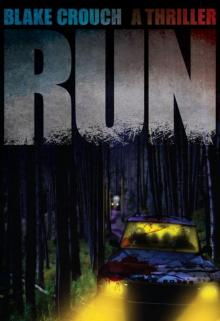 Run
Run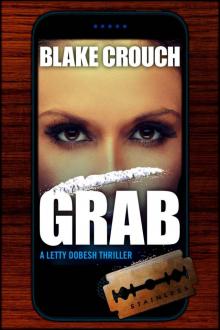 Grab
Grab Four Live Rounds
Four Live Rounds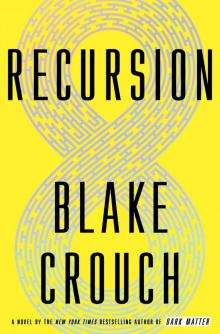 Recursion
Recursion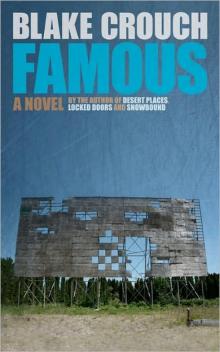 LUMINOUS BLUE: A Novel of Warped Celebrity
LUMINOUS BLUE: A Novel of Warped Celebrity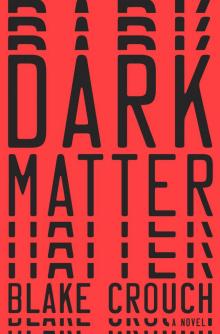 Dark Matter
Dark Matter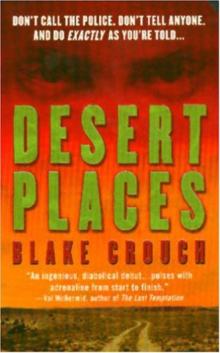 Desert Places
Desert Places Thicker Than Blood - the Complete Andrew Z. Thomas Series
Thicker Than Blood - the Complete Andrew Z. Thomas Series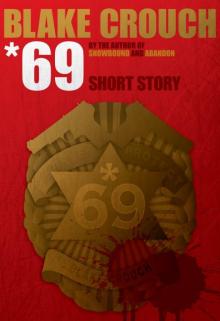 *69
*69 Locked Doors
Locked Doors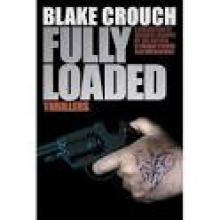 Fully Loaded Thrillers
Fully Loaded Thrillers![Summer Frost [Forward Collection] Read online](http://i1.bookreadfree.com/02/summer_frost_forward_collection_preview.jpg) Summer Frost [Forward Collection]
Summer Frost [Forward Collection]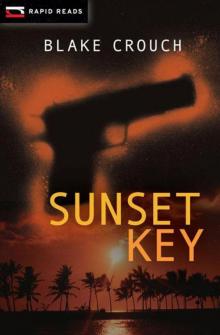 Sunset Key
Sunset Key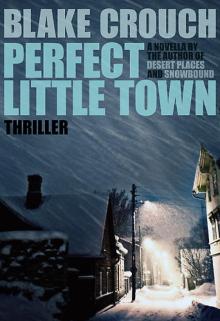 Perfect Little Town
Perfect Little Town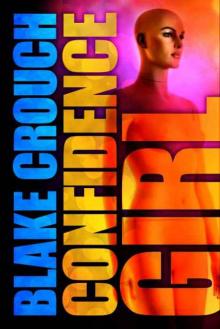 Confidence Girl
Confidence Girl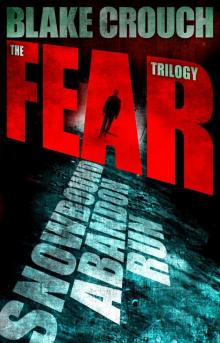 The Fear Trilogy
The Fear Trilogy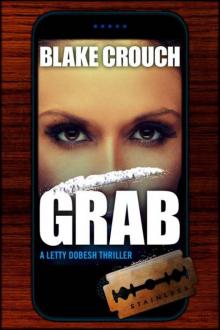 Grab ldm-3
Grab ldm-3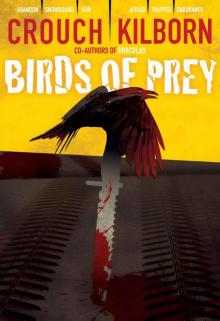 BIRDS OF PREY - A Psycho Thriller
BIRDS OF PREY - A Psycho Thriller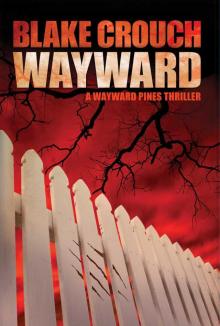 Wayward (The Wayward Pines Series, Book Two)
Wayward (The Wayward Pines Series, Book Two) Hunting Season: A Love Story
Hunting Season: A Love Story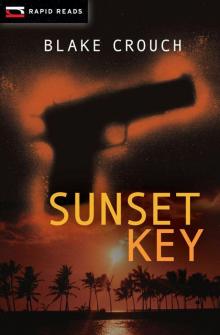 Sunset Key (Rapid Reads)
Sunset Key (Rapid Reads)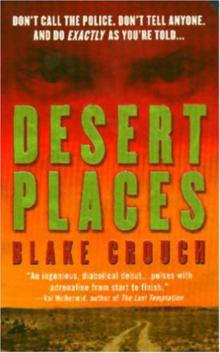 Desert Places: a Novel of Terror
Desert Places: a Novel of Terror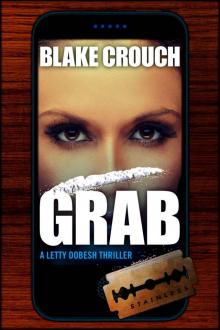 Grab (Letty Dobesh #3)
Grab (Letty Dobesh #3)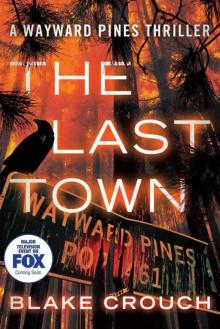 The Last Town (The Wayward Pines Trilogy 3)
The Last Town (The Wayward Pines Trilogy 3) LOCKED DOORS: A Novel of Terror (Andrew Z. Thomas Thriller)
LOCKED DOORS: A Novel of Terror (Andrew Z. Thomas Thriller) BREAK YOU: A Novella of Terror (Prequel to Stirred) (Andrew Z. Thomas/Luther Kite)
BREAK YOU: A Novella of Terror (Prequel to Stirred) (Andrew Z. Thomas/Luther Kite)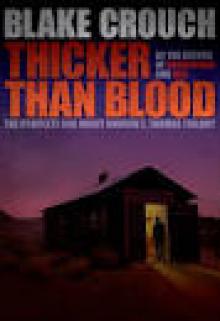 Thicker Than Blood - The Complete Andrew Z. Thomas Trilogy
Thicker Than Blood - The Complete Andrew Z. Thomas Trilogy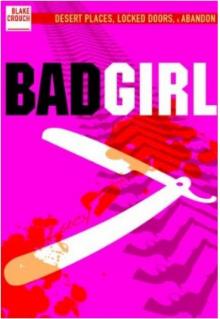 Bad Girl
Bad Girl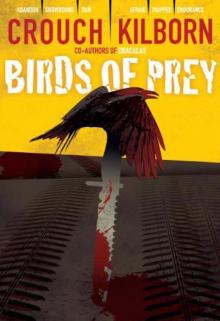 Birds of Prey
Birds of Prey SERIAL KILLERS UNCUT - The Complete Psycho Thriller (The Complete Epic)
SERIAL KILLERS UNCUT - The Complete Psycho Thriller (The Complete Epic)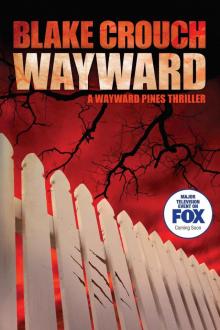 Wayward (The Wayward Pines Trilogy, Book 2)
Wayward (The Wayward Pines Trilogy, Book 2)